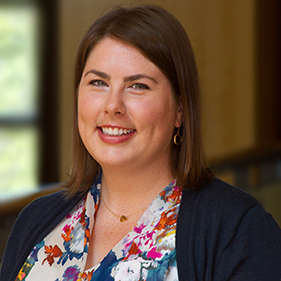Study suggests telehealth screening of some infants could aid in early autism support
MIND Institute research finds early developmental monitoring may improve access to care
New UC Davis MIND Institute research suggests that telehealth evaluation could help improve access to care for infants with an elevated likelihood of autism. The study, published recently in Autism, found that telehealth approaches in the first year of life could help families facing barriers to care such as geographic distance and long waitlists and aid in early diagnosis and intervention.
“The goal is not to diagnose infants with autism,” said Meagan Talbott, assistant professional researcher in the Department of Psychiatry and Behavioral Sciences and a MIND Institute faculty member. “It is to provide a developmental evaluation to help bridge the gap that we know parents face when they first notice symptoms until their children ultimately receive an autism diagnosis.”
Talbott notes that many families seeking early evaluations for autism face long provider waitlists, must often travel to centers with appropriate expertise and are frequently told by providers to “wait and see.”
Since specialized services for autism are generally tied to having a formal diagnosis, there are usually years between when parents first have questions and when they can access services.
“This results in significant stress for families and delayed support to infants and their caregivers. We hope this study shows one way that we can help improve families’ access to early evaluations and early services and support them,” said Talbott.
The goal is not to diagnose infants with autism. It is to provide a developmental evaluation to help bridge the gap that we know parents face when they first notice symptoms until their children ultimately receive an autism diagnosis.—Meagan Talbott
Developmental evaluations via telehealth
The study involved 41 infants, ages 6-12 months, whose parents had concerns about social communication or autism. They were recruited nationally in three cohorts. One quarter of the infants had siblings with autism.
Talbott’s team used the TEDI (Telehealth Evaluation of Development for Infants), a protocol for conducting behavioral assessments that they previously developed. It uses a parent-coaching model to engage parents and infants in a specific set of interactions such as peek-a-boo, playing with toys and reading a book over 45-90 minutes. The examiner scored social communication, play, imitation and other developmental domains. Parents also filled out a series of questionnaires. All families were also sent a small kit of toys needed for the assessment, including blocks, a soft book, rattles, a small blanket and bubbles.
The majority of infants demonstrated elevated likelihood of autism on both the parent-reported questionnaires and examiner-rated behavior. This included decreased communication skills and delayed achievement of developmental milestones. Caregivers’ ratings of the usefulness of the TEDI evaluation were very positive.
The findings may also help to expand infant autism research beyond sibling studies, which have dominated the field. “We hope developing these tools for telehealth will help us to expand infant research beyond the sibling context and help us to understand early development in other groups,” explained Talbott.
What’s next for telehealth evaluation?
“My vision is that in the future, if a family has a concern about their infant’s development, we could incorporate a telehealth evaluation like this as a second-level screener to help families figure out whether pursuing a full autism diagnostic assessment makes sense for their infant,” Talbott explained. “We’re very lucky in Sacramento that we have the MIND Institute, but there are many places where families are pretty far from somebody who has our level of expertise.”
The research team will soon start working with community members, families, pediatricians and other providers involved in early autism intervention to find out how developmental evaluation and monitoring via telehealth may fit into the existing care system. In the future, they hope to develop additional online programs to pair with these evaluations to further support families during this early period.
Talbott’s work started before the COVID-19 pandemic, but she noted it was nice to have already done the telehealth legwork. “The pandemic illustrated how critically important telehealth can be,” Talbott said.
The study was supported by the Department of Psychiatry and Behavioral Sciences, the National Institute of Child Health and Human Development (R21 HD100372, PI: M.R.T.; U54 HD079125 and P50 HD103526, MIND IDDRC PI: Abbeduto), and The National Center for Advancing Translational Sciences and National Institutes of Health (UL1 TR00000; UL1 TR001860; KL2 TR001859)
The UC Davis MIND Institute in Sacramento, Calif. was founded in 1998 as a unique interdisciplinary research center where families, community leaders, researchers, clinicians and volunteers work together toward a common goal: researching causes, treatments and potential prevention of challenges associated with neurodevelopmental disabilities. The institute has major research efforts in autism, fragile X syndrome, chromosome 22q11.2 deletion syndrome, attention-deficit/hyperactivity disorder (ADHD) and Down syndrome. More information about the institute and its Distinguished Lecturer Series, including previous presentations in this series, is available on the Web at mindinstitute.ucdavis.edu.


